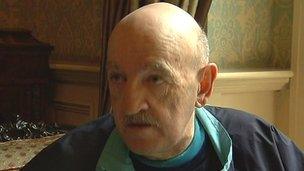WWII Irish 'deserters' finally get pardons
- Published
In Ireland's war memorial gardens, the dates of both world wars are carved into the stone of a monument.
But this country remained neutral in the conflict between 1939 and 1945.
In order to fight in World War II, thousands of soldiers left the country and the Irish Army to join the British forces.
They became known as deserters - a title intended to carry shame. And when they returned after battle many were treated as anything but heroes.
'Made to feel ashamed'
Paddy Reid: "I was told as a kid - your father is a traitor, you should be ashamed of him"
In Paddy Reid's home there are pictures of his father Paddy senior serving alongside British troops in Burma. For years they remained in the attic largely ignored.
"I am sure when my dad came back he didn't feel ashamed but he may have been made to feel that," Mr Reid said.
"I was told as a kid - your father is a traitor, you should be ashamed of him.
"There was no relief, no sense of a job done... It was pretty oppressive in this country."
Apology and pardon
Deserters were found guilty of going absent without leave by a military tribunal.
Their punishment came after the war when many of the soldiers headed home to Ireland.
They were barred from holding jobs paid for by the state, they lost their pension rights and many faced discrimination.

Defence Minister Alan Shatter is due to announce the pardon for the soldiers
Last year the Irish government apologised for the way they were treated and on Tuesday Defence Minister Alan Shatter is due to announce details of a pardon during a debate in Ireland's parliament, the Dail.
The legislation is expected to be passed and signed into law by the Irish president within days.
The bill also grants an amnesty and immunity from prosecution to the almost 5,000 Irish soldiers who fought alongside the allies.
Campaign victory
Campaigners say only a handful of men are still alive, but it is a victory for their long battle to ensure the troops' service is properly recognised.
"It might be an historical issue for the politicians, but not for the families," Peter Mulvany, coordinator of the Irish Soldiers Pardons Campaign, said.
"It will be a recognition that the experience they went through post-war was unfair.
"It was a punishment that they should not have been given.
"This amnesty, this exoneration will remove that stigma."
Upset at deserters
The soldiers were, of course, always proud of having played a part in the battle against Nazi Germany.
But leaving one army to join another was controversial in the 1940s.
The relationship between the relatively recent Irish Free State and Britain was strained.
And there was a practical reason for people to be upset - many felt the men were needed at home.

Paddy Reid jnr said his father could not get a job for years after returning to Ireland
In his house, Paddy Reid has a letter from a soldier who served in the Irish Army during the war years.
In it, the former officer criticises the way the deserters were treated after 1945, but he says within the country's forces there was anger at their decision.
They believed that every soldier was needed to ensure Ireland was able to defend itself against the threat of invasion.
Effect on families
However, the punishment the former troops faced had an effect on their whole families in peacetime.
"My dad could not find work for many years - in fact his first real job was not until 1961," said Mr Reid, who became visibly upset as he remembered what happened decades ago.
"My mother was the one who really carried the stress of trying to survive on almost nothing.
"It was tough trying to bring up kids with no money and abuse at the same time.
"It was a whole lifetime of defending your dad."
In Ireland, time has brought a new perspective to the actions of the men dismissed as 'deserters'.
Their families hope a pardon will mean in future they are remembered only with honour.
- Published2 February 2012
- Published23 January 2012
- Published28 December 2011